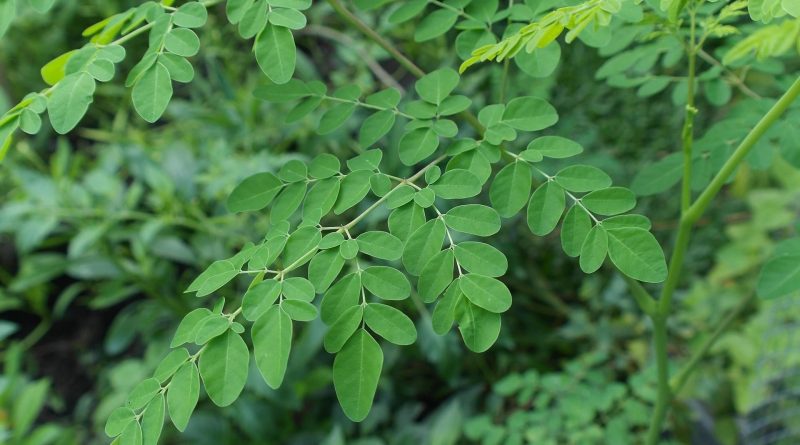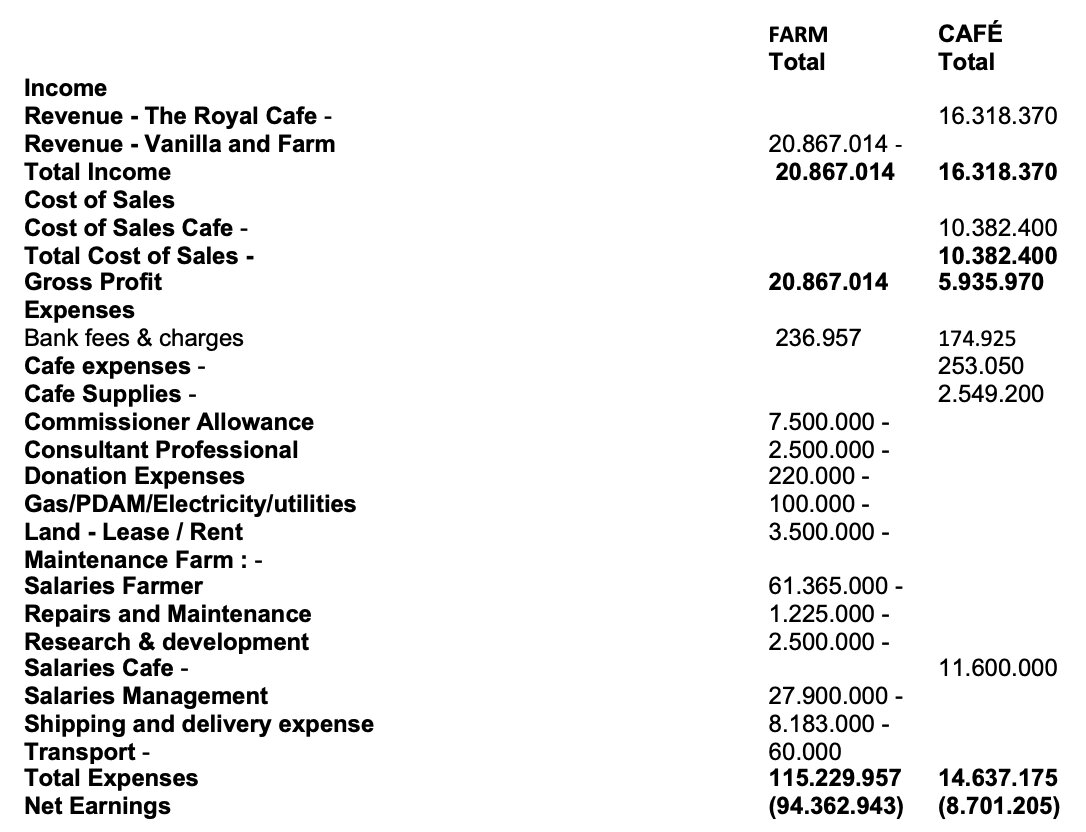
As November comes to a close, I find myself looking back over our successes and failures over the years we’ve been going.
Our biggest failure has been in not raising enough money, for which we apologise to all shareholders, because this has a material consequence in the form of delayed dividends, for a lack of investment means a lack of growth. On the positive side, it has forced us to work within our means and not make expensive mistakes.
Our other major mistake was to allow the then plantations director to plant vanilla in an unproven manner seeking to create intensive organic farms. This is 100% recoverable, and we are actively doing it, while bringing in secondary crops. But it has caused garden failures and a delay in vanilla coming to full harvest potential.
There are so many positives to appreciate, however. First, we absolutely know how best to grow vanilla, having done so much experimentation. We know what works and what doesn’t. We know how to pollinate for the best results. We know to keep the numbers down for higher quality. We know the importance of late harvesting for quality. We know how to process the vanilla for top quality. Although we had intended originally to import an expert from Madagascar, we have worked it out ourselves.
Through the café, we have learnt how fabulous a spice vanilla truly becomes, when it is used as a condiment. We are slowly awakening to the fact that we can make so much more money by creating products from the vanilla than from selling the raw material! We always had this in mind, but the reality is far greater than we originally appreciated. The café is also by far the best way to sell vanilla as well as increasing demand.
The vanilla market is curious, still apparently in the doldrums, but this is the wholesale market where everyone is competing on price alone and buyers trying to drive down the price. They are nearly all middlemen, even the foreigners who come to Indonesia seeking vanilla. Very rarely do you meet an end user, and they pay a much higher price. So, the challenge here is to meet the end users. One bought AUD 50 worth of premium, and received about 25 beans. They cost nearly $10 each back home… and that is at our top price of ten million rupiah.
In buying vanilla from other farmers, we have made numerous friends and we have succeeded in getting many to harvest at full ripeness, but the cost of doing so is that 70% of our stock is of lower quality that we cannot sell to the quality market. Nevertheless, this vanilla still contains vanillin, and our current challenge is to extract the goodness and imbue it into other products which we can sell for a good price.
There are many such products.
Our first is extract. We make a lovely extract, which we are still improving. I guess we always will be! We can sell this as a perfume that is a mosquito deterrent. Royal Spice Vanilla Extract – attracts men, detracts mosquitos! This is a simple process to make, simply using alcohol which is cheap.
Then we have vanilla syrup. Although this is wildly popular, for it is quite delicious and I am tempted to say healthy, for it made from the sap of the arenga tree, simply reduced, and mixed with vanilla. This has 50% more minerals and vitamins than any other sweetener. In due course we shall explore this with scientific analysis as we believe it may bear fruit in marketing. Actually, we use the sap as the solvent to remove the vanillin from the beans. Currently, this is not particularly profitable, but starting 1st December, we have an expert tapper joining us who will collect the sap from our own trees, already in the gardens. Suddenly, this becomes highly profitable.
And here we learn a massive lesson. Anything we grow ourselves is profitable – if we have to buy the materials, profits are cut substantially. Therefore, we are not putting any effort into products we do not grow ourselves: pate, bacon, jam. Although we may create a mulberry jam in 6 months, as we are using mulberries as host trees.
Another of our host trees is the Moringa, whose leaves are considered by many as a Superfood. I hate the term! Nevertheless, we have lots of it and can harvest the leaves monthly. So, we are experimenting with teas: Moringa and Vanilla; Moringa and Soursop (another host tree); Moringa and Lemongrass (which grows in the plantations); Moringa and Blue Pea; Moringa and Mulberry. The biggest issue in creating a new product is the packaging, so at first, we shan’t use any. We’ll have large jars in the shop with the product. Anybody wants some, weighed and packed in paper bags. Anything becomes wildly popular and we can market it.
Meanwhile, the orchids are growing well, most of the flowering is over, in contrast to last year. There are a few outlier flower buds, but generally done. The size is substantially bigger, and we have at least three times last years’ crop. We have two new gardens in development, where we are taking much more time. We haven’t got around to officially renaming the gardens yet!
Last month, we received no investment. This actually forced us to take a personal loan, and this lack of investment is really impacting the business. Usually, we receive about USD 10,000 per month, enough to keep us going but insufficient to develop the business. This is why we are forced to explore new areas through the café. There is a special offer available to any investors who would like to increase their holding, with additional gifts. Get in touch if this is you!
We are waiting a visit from a gentleman who has already promised us 1 million USD investment, for due diligence. He’s been called to Europe and will visit on his return. We’ve been here before, but this time he is genuine. However, we are very much a side-line and not of primary interest, so not causing us to stop all fundraising efforts. At his request, we created a document showing how we would use the investment and when the tranches would be required. The results are pleasing – a forecast showing 69 billion return with a 40 billion profit.
We also created a document showing the result of no further investment. This shows we need a further 400 million rupiah to be in the black and provide a 2 billion rupiah profit next year. Without it, we cannot survive. This is a direct result from not receiving enough funding to buy green vanilla last spring. We have 100kg of grade A and B, and 300kg of lower grades. The lower grades are best used for extraction, while we sell the top grades from 7 to 10 million rupiah per kg. This is a retail price, so takes time. We are supplying a few large importers, but with small test quantities. If they are pleased, we can take orders for next year. This is a slow process, but there isn’t much vanilla around.
The order for 5,000 bottles of extract has not been fulfilled. They have not paid for their first 100 bottles. Lots of reason involving moving office after losing theirs. Our 3-month matured extract is far superior, and this month we shall start selling it to Spas.
For those of you wondering why we do not focus on the beans, let me be clear. There has been insufficient investment to produce the quantity of vanilla making it worthwhile selling the beans, or to fund the trip with samples to visit the buyers. Therefore, we must focus on selling vanilla derivatives, which actually are vastly more profitable. Next year will see a much larger harvest of our own beans, but we still need to buy in vanilla for curing.
The café is selling all the lobsters we can produce at the moment. We may have to stop selling lobster in the café to build up a larger breeding stock.
We have buyers waiting for these, but again we need more investment and this is a secondary project without that investment.
As of December, we are harvesting our own Arenga sap, from which we can make syrup. We have a dozen trees already in the plantations, which sadly the vanilla doesn’t like as a support tree. Every time a tree puts out a new bud, we can tap the stalk of the flower and collect sap for 4 months. This is a lot of sap. This product gives us tremendous room for growth with no investment in the manufacture, just the packaging and marketing.
We shall only sell this in the shop, as we have to buy the pineapple. They may be cheap, but the principle stands.
It looks like we may need to start planning this! We have a potential investor who can also supply expertise for this project.
Going in fits and starts. Three days strong, a week with few customers. But it continues to provide an excellent showcase for vanilla and is our manufacturing base until the factory is built.
Investment for November was nil, keeping a total of all investment Rp 11,723,973,210.
We have investment proposed for January.

We have more solid interest in the company than ever before, now we are so close to the take off. We need 400j rupiah, perhaps 25,000 USD, to take us making a profit by May. We cannot see large profits coming in before that, no matter how much is invested, because the core business will start buying in February, maybe January, and then needs 5 months to cure the vanilla. Our own crop will start harvest in May. How profitable next year will become depends on investment, for the core sale of vanilla beans. The syrup isn’t an issue, because production is continuous and the same for Moringa. However, to reach a larger market, we need to produce Moringa tea in teabags, which requires investment.
Given the investment, we can immediately build the processing centre and the laboratory, which will improve quality and our sales. We can also purchase sufficient ripe green vanilla to really make a profit, and we can expand into other spices.
The starlings are doing well and starting to exhibit courtship behaviour, carefully inspecting the nestbox. The Café has a new tour, a Water Blessing in the Holy River Pakerisan that flows from Tirta Empul. This generates donations for the local Banjar (village council).
Rex Sumner
Royal Spice Gardens is an Indonesian Foreign Investment Company, in Indonesia known as a Perusahaan Modal Asing (PMA).
NIB Licence number 0220100502286. NPWP: 94.830.504.0- 905.000.
PT Royal Spice Gardens Indonesia, Jl. Prof. Dr. Ida Bagus Mantra, Jl. Pantai Saba No. 999 x No. Perempatan, Saba, Blahbatuh, Gianyar, Bali 80581 Indonesia
Website by Simia Solutions / Cre8 Design Studio
Powered by Pak Kriss’s Compliance Framework.
Even in uncertain times, credible, stable & realistic opportunities are available for the astute investor.
Get the edge by obtaining clear, concise and rapid information. Fill out the form to receive our latest prospectus!